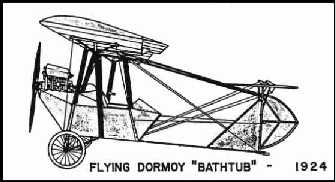 |
|||||
| Home | Research | For Teachers | HISTORY Level 1 Level 2 Level 3 |
PRINCIPLES Level 1 Level 2 Level 3 |
CAREER Level 1 Level 2 Level 3 |
| Gallery | Hot Links | What's New! | |||
| Web Administration and Tools | |||||
 |
|||||
| Home | Research | For Teachers | HISTORY Level 1 Level 2 Level 3 |
PRINCIPLES Level 1 Level 2 Level 3 |
CAREER Level 1 Level 2 Level 3 |
| Gallery | Hot Links | What's New! | |||
| Web Administration and Tools | |||||
![]()
|
Aeronautical Engineer Designer and Pilot Born Vandoncourt, France November 10, 1885 - February 28, 1959 |
Etienne Dormoy graduated from the Industrial Institute of Northern France in Lille in 1906
with a Civil Engineering degree from the Electrical Department. He joined the French
Military as an engineer. After completing his service, Etienne joined the
Deperdussin Company as a draftsman. He became an expert at building monocoque
fuselages—a fuselage
built by wrapping and gluing thin strips of wood around a form to make a strong airplane
body without any struts.
Etienne came to the U.S. in 1913 and built the first true monocoque fuselage for
Maximillian Schmiddt. This airplane won the 1914 New York Times 4th of July Race.
Etienne then returned to France and joined the French Air Force and became a pilot
in 1915. He flew bomber flights before becoming one of the first pilots to make night
flights in search of Zeppelins. In January 1916 Dormoy flew his last mission.
He was not released from the French Air Force at that time but was sent back to the
Deperdussin Company to help design the S.P.A.D. According to Dormoy, his service
with the French Air Force ended in 1917.
In 1917, through an agreement between the United States Army Signal Corps and the
Deperdussin Company, Dormoy was brought to the U.S. to teach the Americans how to build
the S.P.A.D. He came to the U.S. with two S.P.A.D.s and blueprints to help Americans
build the airplane. Several fuselages were made at the Curtiss Elmwood plant but none were
completed due to the lack of Hispano engines. Etienne worked for the Packard Motor
Company for a short time but was fired for drawing airplane designs instead of
automobiles.
Next, he joined the U.S. Army Air Force as a civil engineer. During this time he
built his 1924 "Flying Bathtub" from parts he bought at a hardware store.
The only component not from a hardware store was the Henderson Motorcycle engine. His
plane won the 1924 Dayton Daily News Light Airplane Contest and the Rickenbacker
Trophy.

Drawing by Jerry M. Turner
Etienne left the U.S. Army Air Force in 1925 and joined the Buhl Aircraft Company.
He designed all the Buhl planes including the Spokane Sun God, the first plane to fly from
Spokane, Washington to New York City and back nonstop.
It was fueled in the air. After the Buhl Company closed due to the depression,
Etienne joined the Boeing Aircraft Company of Seattle. He was assigned to the wind
tunnel division and helped design the P—26 Peashooter, a well received fighter plane
that remained in service in Guatemala until 1957. It is also featured on the U.S.
Classic Aircraft Postage Stamp.
Etienne became an U.S. citizen in Seattle before joining Consolidated Aircraft Company of
San Diego. He helped Isaac Laddon design the Catalina PBY before he was sent to
Russia to oversee an American crew who was helping the
Russians build the PBY. He returned to the U.S. in 1938 and work for Consolidated (later
renamed Convair) until he retired in 1958 as senior design engineer. In a interview
in February,1958, Dormoy claimed that he was the designer of the first monocoque fuselage.
This may have contributed to the decision to end his flying missions in 1916 and
sent him back to the Deperdussin Company. Mr. Dormoy died in 1959 of a heart
ailment.
This biography was provided by Jerry M. Turner and Richard L. Meister Jr.
©1998 by Jerry M. Turner & Richard L. Meister Jr.
This biography was modified by the ALLSTAR network, based on more recent information
provided by the authors. A similar, but more detailed, biography, also written by
Mr. Turner and Mr. Meister, may be found by clicking here.
Send all comments to ![]() aeromaster@eng.fiu.edu
aeromaster@eng.fiu.edu
© 1995-98 ALLSTAR Network. All rights reserved worldwide.
Updated: 24 February, 1999